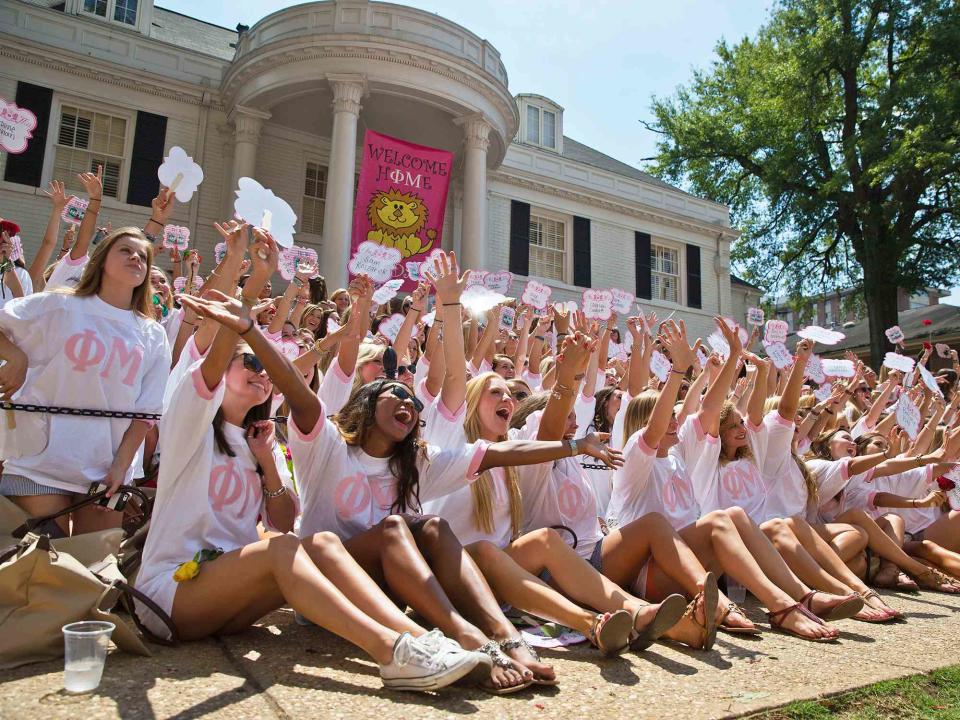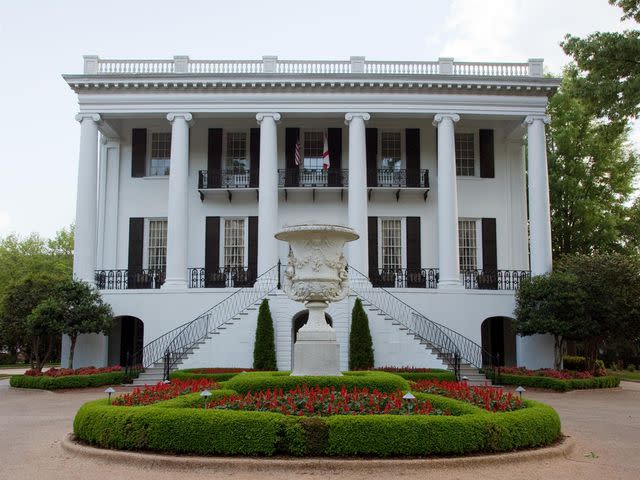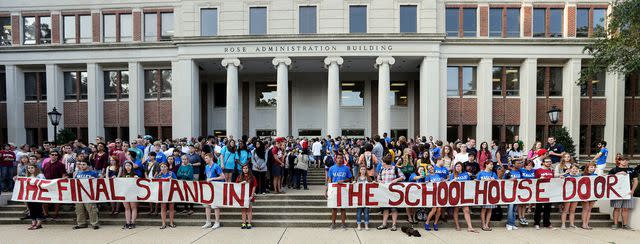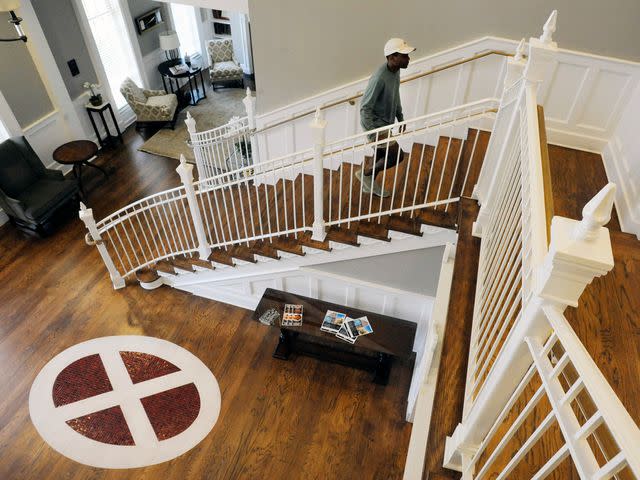What Is The Machine in 'Bama Rush'? Everything to Know About the Controversial Secret Society
The Max documentary 'Bama Rush' sheds light on the secretive University of Alabama society, The Machine

Brynn Anderson/AP
In August 2021, videos of sorority recruitment at the University of Alabama — where more than 2,500 potential new members (PNMs) compete for spots in 19 houses — began to flood TikTok. The clips of Alabama’s rush week, under the hashtags #BamaRush and #BamaRushTok, quickly went viral — and even spawned a Max documentary on the phenomenon.
The documentary, titled Bama Rush, promises to provide a more in-depth look into the highly competitive world of sorority recruitment and Greek life at the university. In the process, the film also sheds light on The Machine: a not-so-secret organization at the university with a history of influence and, at times, controversy.
The Machine operates under the guise of being a secret society, but their power and presence has been well documented at the University of Alabama for decades. The underground organization is reportedly made up of representatives from the school’s top sororities and fraternities, and controls everything from on-campus politics to Homecoming Court elections. A peek at their influence is seen in the trailer for Bama Rush, when a social media comment appears on the screen that reads, “The Machine will stop this!”
When the students participating in the documentary are asked if they have heard of The Machine, their response is quick and blunt: “We shouldn’t talk about that.” However, their hesitation to speak on camera about the secret society is warranted. In 2022, the New York Times reported that Marina Anderson, a PNM, was dismissed from Alabama’s sorority recruitment that year over suspicions she had been recording while inside a house — which is strictly prohibited.
So, what exactly is The Machine at the University of Alabama? Here is a complete look at the controversial secret society, from its beginnings over a century ago to its troubled history over the years.
The Machine is a chapter of Theta Nu Epsilon that dates back to 1914

Brynn Anderson/AP
In 1914, a University of Alabama student named Joseph Lister Hill founded the school’s Student Government Association — and simultaneously created a secret fraternity to control it, The Bitter Southerner reported. That underground society was officially a chapter of Theta Nu Epsilon, a national fraternity that began in 1870 at Wesleyan University. Unofficially, though, it earned the nickname “The Machine” from the school newspaper,The Crimson White, for its political domination at the university.
According to a 1992 Esquire cover story on The Machine, the purpose of Theta Nu Epsilon was to select student leaders and decide campus affairs behind closed doors — since “secrecy guaranteed selfless leadership.” The Machine shares its roots with other infamous secret societies, including Skull and Bones at Yale University (which inspired the 2000 film The Skulls starring Paul Walker and Joshua Jackson). But while many chapters of Theta Nu Epsilon fizzled out by the 1960s, The Machine grew in power and influence, according to Esquire.
According to a 2011 report by The Crimson White, The Machine has representatives from 28 almost-exclusively White fraternities and sororities (reportedly two from each house, one older and one younger). The members of The Machine reportedly secretly select and endorse candidates for the Student Government Association (SGA), allegedly influencing how members of Greek life vote in campus-wide elections. As a result, the underground society “manages to control almost all student-government offices,” Esquire reported in 1992.
The Machine has determined almost every SGA president in Alabama’s history
The Machine’s power at the University of Alabama is undeniable: a reported 1989 Machine pamphlet uncovered by Business Insider in 2013 stated that the society had elected 68 out of the 75 presidents in SGA’s history. “This is because the SGA is ours,” the pamphlet claimed.
This success rate is due to some questionable and alleged Machine tactics. Esquire alleged that the Machine hires vans to take voters to the polls and, upon arrival, plies them with beer and tells them who to vote for. The outlet also claimed that some fraternities will fine members who don’t vote (up to $50). On the sorority level, a poster is supposedly hung in each house on election day, detailing which SGA candidates they are supporting, according to The Crimson White. The school newspaper also reported that The Machine allegedly funds their SGA candidates’ campaigns using dues paid by the participating fraternities and sororities.
“Elections lost by The Machine are very few and far between,” Alabama professor emeritus Bill Stewart told the Tuscaloosa News in 2013.
As a result, only a handful of non-Machine candidates have ever been elected president in the 100-plus years that the SGA has existed. The most recent example came in 2015, when Elliot Spillers became the first non-Machine-backed candidate to win SGA president in nearly four decades, according to HuffPost. Spillers was also only the second Black president in the SGA’s history.
However, Spillers still gave partial credit to The Machine for his victory.
“The entire Machine is not a bad organization,” Spillers told HuffPost. “It took members within that organization to stand beside me and go against the grain and get me elected to this office. Just like the rest of us on campus, they're ready for change. They're ready for an inclusive environment on campus.”
But previous independent candidates at the University of Alabama have reportedly experienced a darker side of The Machine. In 1986, John Merrill — who was the last man before Spillers to defeat The Machine — had his office broken into by alleged members of the secret organization, The Crimson White reported. The Machine also allegedly threatened to rape Merrill’s wife.
Joey Viselli was another independent candidate who ran against The Machine in 1989. He was a popular pick, thanks to his father’s local restaurant, Bama-Bino’s Pizza, but narrowly lost the election, according to Esquire. However, The Machine was reportedly bitter at the close race and organized a boycott of Bam-Bino’s — which had previously gotten large orders for SGA and Greek life parties. As a result of the boycott and loss of business, Bama-Bino’s was forced to close.
“I was attacked. For what? Because I raised a child who has ideas?” Joey’s father, Fran Viselli, told Esquire.
The Machine also reportedly controls student government policies and decisions

AP
The Machine’s influence doesn’t stop after election day: The SGA president and senators who were elected with The Machine’s help are also expected to vote a certain way once in office, according to The Crimson White. The Machine allegedly determines what bills and measures it wants to support or undermine — and there are potential consequences for not following along.
Machine-backed SGA members allegedly face both personal and house-wide repercussions for voting against the secret society’s wishes. According to The Crimson White, those potential punishments include being deemed a social outcast or losing your fraternity or sorority’s ability to have “swaps” (or themed parties). The school newspaper added that fear-based control extends all the way up to the University’s administration, claiming that they won’t take steps against The Machine because they’re afraid they’ll lose their jobs.
But voting in line with The Machine’s interests supposedly has its benefits: Machine representatives are reportedly rewarded with alcohol or paid bar tabs, The Crimson White reported. Additionally, their fraternities or sororities will allegedly receive Machine-funded private parties. There is also an alleged annual beach trip for Machine representatives in student government.
The Machine’s power grip has also reportedly influenced sorority recruitment

HBO MAX
The extent of The Machine’s influence goes beyond student government — it has also reportedly impacted how the University of Alabama sororities recruit their members.
In 2000 and 2001, a highly-qualified student named Melody Twilley attempted to become the first Black woman to join an all-White sorority at the University of Alabama. On paper, she was an ideal candidate: Twilley had a 3.87 GPA, skipped ahead two grades in high school, sang in the campus choir and even had written recommendations from Greek alumni that university faculty helped her secure, according to the Los Angeles Times. However, two years in a row, all of the 15 White sororities at the time rejected Twilley — allegedly at the urging of The Machine, per The New Republic.
“The Machine ... put the word out that any sorority that accepted a Black girl wouldn’t get invited to parties,” Pat Hermann, a University of Alabama English professor, claimed to the Seattle Times in 2001.
Then, in 2003, The Machine allegedly orchestrated the first time an all-White sorority extended a bid to a Black woman in an attempt to reform its image. According to Tuscaloosa News, a current Gamma Phi Beta member claimed to The Crimson White in 2003 that The Machine allegedly bribed the sorority to extend a bid to Carla Ferguson, a Black student, in exchange for the sorority’s admission into the not-so-secret society.
“The Machine is getting sick of everyone telling them how racist they are, so they decided to desegregate the sorority system this year,” a comment on a Greek message board alleged, per Business Insider. “However, none of the ‘top’ chapters wanted to risk their reputations by bidding an African-American, so they wanted one of the not-so-prestigious sororities to do [so] instead. They promised Gamma Phi entrance into The Machine as a bribe, which would theoretically raise their social standing on campus.”
The Machine has a decades-long history of reported racism

Dave Martin/AP
Over the 100-plus years of The Machine’s existence, there have been several stories of alleged racism beyond their sorority recruitment tactics.
In 1976, Cleophus "Cleo" Thomas defeated The Machine and became the first Black president of the SGA. His victory was achieved, in part, thanks to the support of White sororities (who, at the time, were not represented in The Machine). As a result, as many as 15 men — widely reported to be members of or influenced by The Machine — dressed in white cloaks, burned crosses and sang revolutionary songs on the lawns of the sorority houses after Thomas’ win, according to The Crimson White.
It “was almost a benign act of terror,” Thomas told the Tuscaloosa News in 2006. “It was so uncreative — at least to me.”
Ten years later, in 1986, The Machine was rumored to be behind another cross burning — this time on the lawn of a Sorority Row home that Alpha Kappa Alpha, a historically Black sorority, was considering using as a residence, both the AP and The Crimson White reported. At the time, University Relations Director Mike Ellis called the cross burning “a school prank” and no charges were filed, according to the AP.
In 1999, a Black independent candidate for SGA president named Fabien Zinga claimed he had received racist threats that he believed came from The Machine. Zinga told CNN that his campaign signs had been defaced with racial slurs and that he had received a late-night phone call from a man who threatened him with violence.
“What I vividly remember,” Zinga told CNN, “is when he says ‘We are going to hang you from the tree.’ ”
In 1993, the SGA was suspended for three years after a violent (and rumored Machine) attack
The Machine doesn’t only have a racist past — there are also stories of violent attacks throughout its century-old history. One of the most widely reported instances came in 1993, when Minda Riley, a non-Machine candidate for SGA president, was assaulted in her home by a masked, knife-wielding man, according to the AP.
The attack allegedly left Riley with “a golf-ball-size bruise on her cheek, a busted lip and a knife wound on the side of her face,” Riley's older brother Rob Riley and her campaign manager Scott Batey claimed in a statement to The Crimson White .
Rob Riley was The Machine-backed SGA president in 1987. He also alleged the attack against his sister was done by a member of The Machine or a Machine-backed candidate, per The Crimson White.
“Today The Machine is a little club of thugs and cowards,” he said. “I wouldn’t be associated with The Machine today for any price, and I don’t blame my sister for not wanting to associate with this group either.”
As a result of the attack, the University of Alabama shut down the student government, suspending it until 1996 in an attempt to reform campus politics.
In 2013, The Machine was accused of rigging a local election
The Machine’s reach extended beyond campus borders in 2013, and the secret society reportedly rigged a Tuscaloosa City Board of Education election, the New York Times reported.
In 2013, then-26-year-old Cason Kirby (a former Machine-backed SGA president) narrowly defeated the incumbent Kelly Horwitz for the District 4 Board of Education seat, according to Tuscaloosa News. His victory was reportedly aided by The Machine, who allegedly sent emails to sororities and fraternities encouraging members to vote for Kirby. The Machine also reportedly provided stretch limousines and a bus to bring students to polling locations, and promised free drinks at two local bars to incentivize voting in the local election.
But according to a lawsuit by his opponent Horwitz, the New York Times reported that many of the 416 votes that Kirby received were from illegitimate voters — many of whom registered during one week in mid-August and were 21 or younger. Horwitz initially contested 397 of Kirby’s votes, claiming they violated residency requirements or were “tainted by misconduct, fraud or corruption,” according to The Crimson White.
But in November 2013, a judge dismissed Horwitz’s case — ruling that only 70 of the ballots could be considered questionable, which was short of the 87 she needed to overturn the election results, the Tuscaloosa News reported.
The Machine is still a present force at the University of Alabama

Jay Reeves/AP
While The Machine is still present at the University of Alabama, the group appears to be trying to reform its image in recent years.
In 2017, Jared Hunter became the first Black candidate for SGA president to be backed by The Machine. “Running for office with the support of a group with such a checkered past was one of the hardest decisions I have ever made,” Hunter wrote in The Crimson White before the election.
He continued, “The Machine’s stigma casts a shadow on the history of this university to this day. I wrestled with the dilemma — and eventually realized I had an incredible opportunity. I knew my campaign and my ideas were my own. No matter who chose to support me, I would run on my own terms.”
Hunter won the election, becoming only the third Black SGA president in the university’s history (and the first with Machine support).
“I wouldn’t be surprised if, in five to 10 years, The Machine that we see today is completely different,” he told The Crimson White after his win. “I think progress takes time and this year was the first step in making changes.”
Other students echoed similar thoughts after Hunter’s election. “The Machine is morphing. This is good, since diversity is important for the student body,” Helmi Henkin, a then-junior in a Machine sorority, told The Crimson White.
But for others, The Machine remains the same coercive organization with questionable tactics. In 2015, controversy surrounded the Homecoming Queen election when members of the Alpha Gamma Delta sorority were allegedly persuaded to vote against their fellow sorority member Halle Lindsay (who is Black) — and instead vote for the Machine-backed White candidate from Phi Mu, Katelyn Katsafanas, Teen Vogue reported. If they didn’t vote correctly, the entire sorority would be punished by not being invited to “swaps.” (Though Lindsay was voted onto Homecoming Court that year, Katsafanas ultimately won Homecoming Queen.)
Also in 2015, a sophomore SGA senator named Alex Smith wrote an essay for The Crimson White titled “Why I’m Leaving the Machine.” In it, she described The Machine as an “oppressive system” that she could no longer be a part of.
“What I don’t understand is why The Machine intimidates and suppresses the voices of students while simultaneously sabotaging any progressive plans independents propose, especially when those plans would help every individual on this campus, including Greeks,” she wrote.
Smith continued, “The Machine is actually threatened by the possibility of losing power and its stronghold over Greek and campus politics.”
An SGA senator named Mike Smith expressed similar thoughts to The Crimson White in 2017, claiming that The Machine wasn’t getting any more progressive in nature.
“They don’t care about diversity, equality or inclusion,” he told the school newspaper. “They nominated a woman and a Black man back-to-back to regain control ... after two years of getting over 50 percent, I promise you the basement will throw up a White conservative Old Row fraternity guy for president next year.”
Smith’s prediction was partially accurate: In 2018, a White student named Price McGiffert, a member of The Machine fraternity Kappa Alpha, was elected SGA president. During McGiffert’s tenure, The Machine was suspected of influencing his creation of a new office for diversity and inclusion, according to The Crimson White.
If you or someone you know has been sexually assaulted, please contact the National Sexual Assault Hotline at 1-800-656-HOPE (4673) or go to rainn.org.
For more People news, make sure to sign up for our newsletter!
Read the original article on People.

